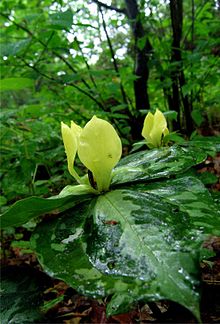Trillium discolor
Appearance
| Trillium discolor | |
|---|---|

| |
| 1831 Illustration[1] | |
| Scientific classification | |
| Kingdom: | Plantae |
| Clade: | Tracheophytes |
| Clade: | Angiosperms |
| Clade: | Monocots |
| Order: | Liliales |
| Family: | Melanthiaceae |
| Genus: | Trillium |
| Species: | T. discolor
|
| Binomial name | |
| Trillium discolor | |
| Synonyms[3] | |
| |
Trillium discolor, the mottled wakerobin,[4] pale yellow trillium, or small yellow toadshade,[5] is a species of flowering plant in the family Melanthiaceae. It is native to areas of the Savannah River drainage system of Georgia, North Carolina and South Carolina[6] such as Steven's Creek Heritage Preserve and Lake Keowee. It is found along moist stream banks in upland woods, on acidic to basic soils.[7]
Description
[edit]Trillium discolor is a perennial herbaceous plant that blooms mid April to early May. It has a flower with pale yellow petals that stand upright at the junction of the three leaf-like bracts.[5]

References
[edit]- ^ by Samuel Curtis and William Jackson Hooker, published in Curtis's Botanical Magazine, volume 58, Plate 3097
- ^ "Trillium discolor". NatureServe Explorer. NatureServe. Retrieved 16 November 2021.
- ^ "Trillium discolor". World Checklist of Selected Plant Families (WCSP). Royal Botanic Gardens, Kew.
- ^ NRCS. "Trillium discolor". PLANTS Database. United States Department of Agriculture (USDA). Retrieved 15 December 2015.
- ^ a b Case Jr., Frederick W. (2002). "Trillium discolor". In Flora of North America Editorial Committee (ed.). Flora of North America North of Mexico (FNA). Vol. 26. New York and Oxford: Oxford University Press – via eFloras.org, Missouri Botanical Garden, St. Louis, MO & Harvard University Herbaria, Cambridge, MA.
- ^ "Trillium discolor". County-level distribution map from the North American Plant Atlas (NAPA). Biota of North America Program (BONAP). 2014. Retrieved 7 October 2019.
- ^ Stritch, Larry. "Mottled Wakerobin (Trillium discolor)". United States Forest Service. Retrieved 7 October 2019.
Bibliography
[edit]- Case, Frederick W.; Case, Roberta B. (1997). Trilliums. Portland, Oregon: Timber Press. ISBN 978-0-88192-374-2.
- Freeman, J. D. (1975). "Revision of Trillium subgenus Phyllantherum (Liliaceae)". Brittonia. 27 (1): 1–62. doi:10.2307/2805646. JSTOR 2805646. S2CID 20824379.

